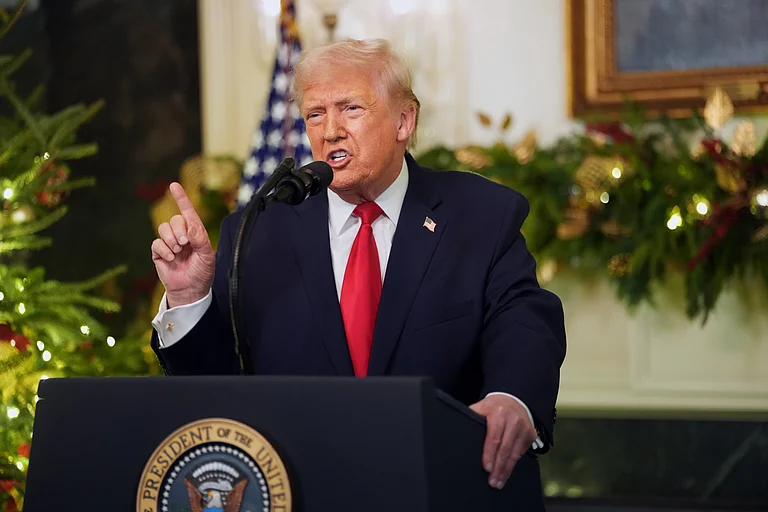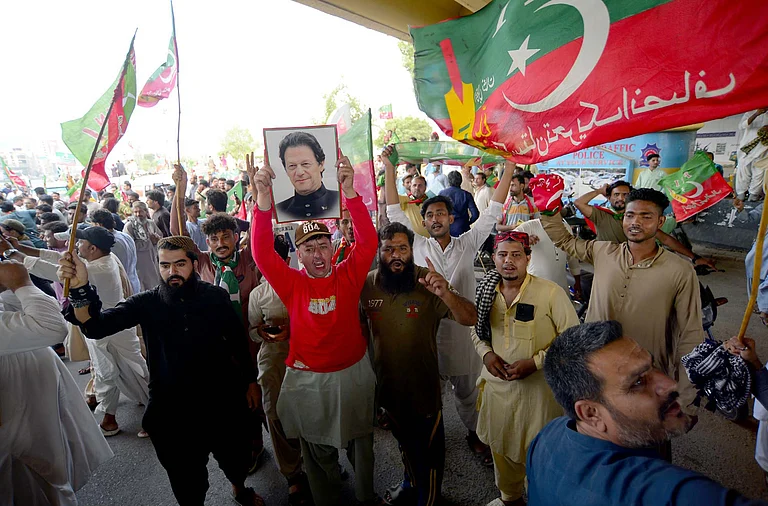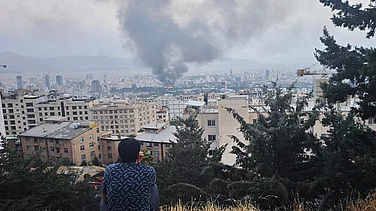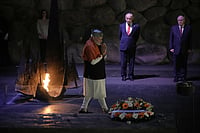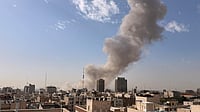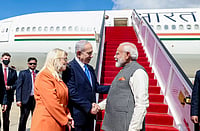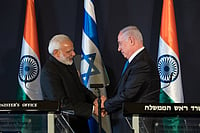Not in his wildest dreams could Imran Khan have imagined that his one-time benefactors would turn against him. He is in prison, banned from contesting elections and the Pakistan-Tehreek-e-Insaf (PTI) has been stripped of its party symbol. Compliant judges have sentenced him to 14-years in prison in one case, 10-years in another and seven in the next. Many of his top rank leaders are in prison. Others have disappeared and surfaced later only to resign from the party.
History was obviously not a subject he read in Oxford or he would have learnt from Pakistan’s recent history that there is a price to pay for the tight embrace of the generals. One cannot escape their grip as Imran Khan has learnt to his chagrin when he fell out with General Qamar Javed Bajwa and tried to charter his own course.
Imran Khan, Pakistan’s cricketing hero, is not a traditional politician. He was immensely popular as the man who brought World Cup glory to the country. Khan was loved for his cricket and admired for his glamorous lifestyle. He dated several beautiful women and married Jemima Goldsmith, the daughter of a millionaire businessman. Jemima opened the door of British high society and the British Royal family to Imran. He came home to set up the Shaukat Khanum Memorial Cancer hospital in memory of his mother who had died of cancer. The hospital offered world class cancer treatment facilities in the Pakistani city of Peshawar and Lahore. His popularity and access helped him to attract huge donations from both within Pakistan and from the UK and US. Philanthropy was the first step to public life for Imran.
It is to his credit that Imran Khan was able to harness people’s adulation and love for him to the Tehreek-e-Insaf the political party he founded in 1996. He wanted to fight for social justice and introduce a new corrupt free politics to the country.
The next year in national elections of 1997, PTI failed to get even a single National Assembly seat. In the 2002 polls, Imran Khan managed to win his lone seat, while the 2013 elections brought in 27 National Assembly seats. The PTI held long marches in a bid to oust the elected government of Nawaz Sharif, claiming the polls were a fraud. He raved and ranted against the Nawaz Sharif government, and when the prime minister fell out with the army top brass, Imran’s star began to rise. Sharif and members of his immediate family were implicated in the Panama Papers, which gave the army the perfect opportunity to throw him out of office with the help of a compliant judiciary.
Imran Khan was now the army’s blue-eyed boy and in the 2018 national elections, the PTI turned in its best performance to date winning a total of 115 seats in the 270 member National Assembly. But he was not able to win 172 seats needed to get an outright majority. He formed the government with the help of smaller parties and the backing of the army.
By the time he was PM, Imran Khan turned his back on his earlier lifestyle and became a pious Muslim dreaming of ushering in an Islamic welfare state or the Riasat-I-Madina, where there would be an equitable distribution of wealth. Imran Khan’s emphasis on religion won him the support of large sections of ultra-religious people across the country as well as the conservative Islamic clergy. This combined with his appeal to Pakistan’s youth has made him a significant force. A large number of middle class Pakistanis and celebrities also joined the PTI bandwagon believing he had something new to offer the country beyond the promises of the traditional corrupt political parties. It was perhaps this sense of overwhelming popularity that had led to Imran Khan’s belief that he could take on the all-powerful army.
Since his defeat through a no confidence movement brought by the opposition against him in April 2022, Imran Khan went ballistic and blamed the opposition, the US and the army for his ouster. He also asked all PTI members to resign from the National Assembly which was a foolish decision. Even worse was his directive that PTI members resign from their seats in the provinces where they were in power in Punjab and Khyber Pakhtunkhwa. He hoped that this would force the Election Commission to call for fresh polls within a 90-day time limit that is laid down in the Pakistan Constitution. That was again a grave error of judgement by the PTI chief.
After his arrest from inside the Islamabad High Court on 9 May 2023, the country went up in flames as his supporters took to the streets in protest. For the first time in Pakistan’s history, the mob attacked and ransacked the home of a senior serving army officer, and shouted slogans against the army. Many buildings were attacked and public property destroyed. This led the new army chief General Asim Munir to order a major crackdown on PTI leaders and their supporters.
Since then it has been a downward trend for the PTI and its leader. Imran Khan has been sentenced to a 14-year sentence in the Toshakhana case. A 10-year jail term in the cipher case and in the latest indictment, another seven years in prison for violation of an Islamic practice for an interval or an “iddat” period before tying the knot with another partner. Imran Khan’s wife Bushra Bibi, who was his spiritual guide before the two fell in love, had divorced her first husband to marry the PTI leader. Her former husband claimed in his case against the PTI chief that Imran Khan and his wife Bushra Bibi were in an adulterous relationship before their marriage. Nothing appears to go right at the moment for the former cricketing hero.
The courts that are playing to the tune of the establishment have ensured that Imran Khan cannot contest elections.
Candidates are fighting but under various symbols. Yet even from prison Imran Khan is hoping to inspire his supporters. The party has excelled in the use of social media, AI and other modern tools that the establishment is finding hard to control. Khan is hoping that people’s anger with the establishment and the kangaroo courts that are trying him have angered most Pakistanis. So they will come out in numbers to vote for his candidates. He is also making sure that candidates are following his diktat. Last month he ordered his party candidates to hold public meetings and warned: “We are monitoring who [is] holding public meetings and rallies and who [is] not. Hold public meetings and bring people out of their homes because when the people come out nobody can stop them,” he told media persons who were covering the cipher case in jail, according to reports in the local press. But he is facing huge constraints, without access to party workers. Everything is being conveyed to his legal team who then relay the Captain's message to his followers. The PTI has fielded over 900 candidates, for the National Assembly and the provincial legislatures, but Imran Khan has not been able to go through all the names or review each candidate’s worth.
At the moment there is just doom and gloom and Imran Khan’s political career appears to be over with the mounting legal cases against him. In 2017, when Nawaz Sharif was removed from power and he had cases stacked against him, he was written off as a political force. Yet he is back from exile, the cases against him are dismissed and he may become the next prime minister of Pakistan. Similarly this is not the end of either Imran Khan or the PTI. The twists and turns of Pakistani politics could see him rise sphinx-like from the ashes.








